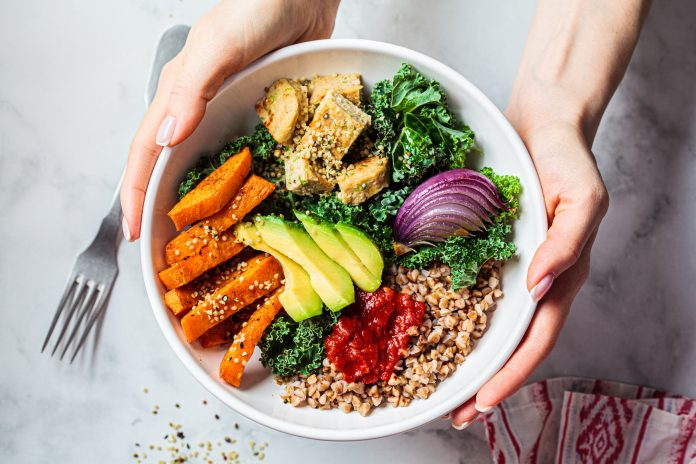
A new study suggests that the quality, or overall healthiness, of a person’s diet may be key to cancer prevention. Based on data from more than 65,000 postmenopausal women who were tracked for more than two decades, the study found that a healthy plant-based diet was linked with a 14% lower risk of breast cancer while an unhealthy plant-based diet was linked with a 20% higher risk of breast cancer. The findings were consistent across all breast cancer subtypes.
“These findings highlight that increasing the consumption of healthy plant foods and decreasing the consumption of less healthy plant foods and animal foods might help prevent all types of breast cancer,” said Sanam Shah, a doctoral candidate in the Center for Research in Epidemiology and Population Health at Paris-Saclay University, Inserm, Gustave Roussy, France. Shah presented the findings at Nutrition 2022 Live Online, the flagship annual meeting of the American Society for Nutrition held this week.
Previous studies have examined cancer risks associated with the Western diet, the Mediterranean diet, and vegetarian diets. Colon cancer, for example, has been linked to a high fat diet. Although some studies suggest diets with less or no meat consumption offer health benefits, results have been somewhat mixed.
For this study, researchers focused on differentiating between healthy plant-based foods — such as whole grains, fruit, vegetables, nuts, legumes, vegetable oils and tea or coffee — and plant-based foods the study categorized as less healthy foods as fruit juices, refined grains, potatoes, sugar-sweetened beverages, and desserts.
“What is different about our study is that we could disentangle the effects of the quality of plant foods, which has not been the focus of previous studies on other dietary patterns,” said Shah. “By scoring healthy, unhealthy and animal-based foods, we comprehensively analyzed food intake by considering the ‘healthiness’ of food groups.”
The researchers analyzed data from 65,574 postmenopausal women living in France who filled out dietary intake questionnaires in 1993 and 2005 and were followed for an average of 21 years. Over the course of the study, 3,968 study participants were diagnosed with breast cancer. Comparing breast cancer rates among women with different dietary quality revealed significant differences in cancer risk among those with healthy and unhealthy diets.
“This cohort dates back to 1990, when it was set up to investigate the risk factors of common cancers prospectively,” Shah told Inside Precision Medicine. “However, several other outcomes have been assessed over time through data collection using biennial questionnaires. Different outcomes studied include skin cancer, type 2 diabetes, hypertension, asthma, dyslipidemia, etc.”
For this study, the researchers used 18 food groups to categorize the degree to which participants adhered to a plant-based versus animal-based diet and ate healthy versus less healthy foods. Shah noted that a plant-based diet does not equate to a vegan or vegetarian diet, but rather describes a general emphasis on plant-based foods over animal-based foods.
Shah points out that the causal mechanisms of the link between healthy and unhealthy plant-based diets and breast cancer risk have yet to be entirely determined. However, previous studies have suggested that high fiber may lower cancer risk via anti-inflammatory and antioxidant effects. It might also lower circulating estrogen levels, thus reducing the risk of breast cancer in postmenopausal women. On the other hand, unhealthy plant-based foods are high in energy, sodium, unhealthy fat, and low in fiber which might be linked to cancer development.
Nonetheless, this is the next step in research to understand the mechanisms underlying these associations.
While the findings suggest that choosing healthy plant-based foods is likely helpful for cancer prevention, Shah noted that more research is needed to assess the connections between diet and cancer risk in diverse populations, in particular, to determine causality.
Remaining questions, she said include, “Assessing the underlying mechanisms of the associations observed between the healthy and unhealthy plant-based diets and breast cancer risk, such as the mediating role of the circulating levels of some metabolites or gut microbiome studies. “













